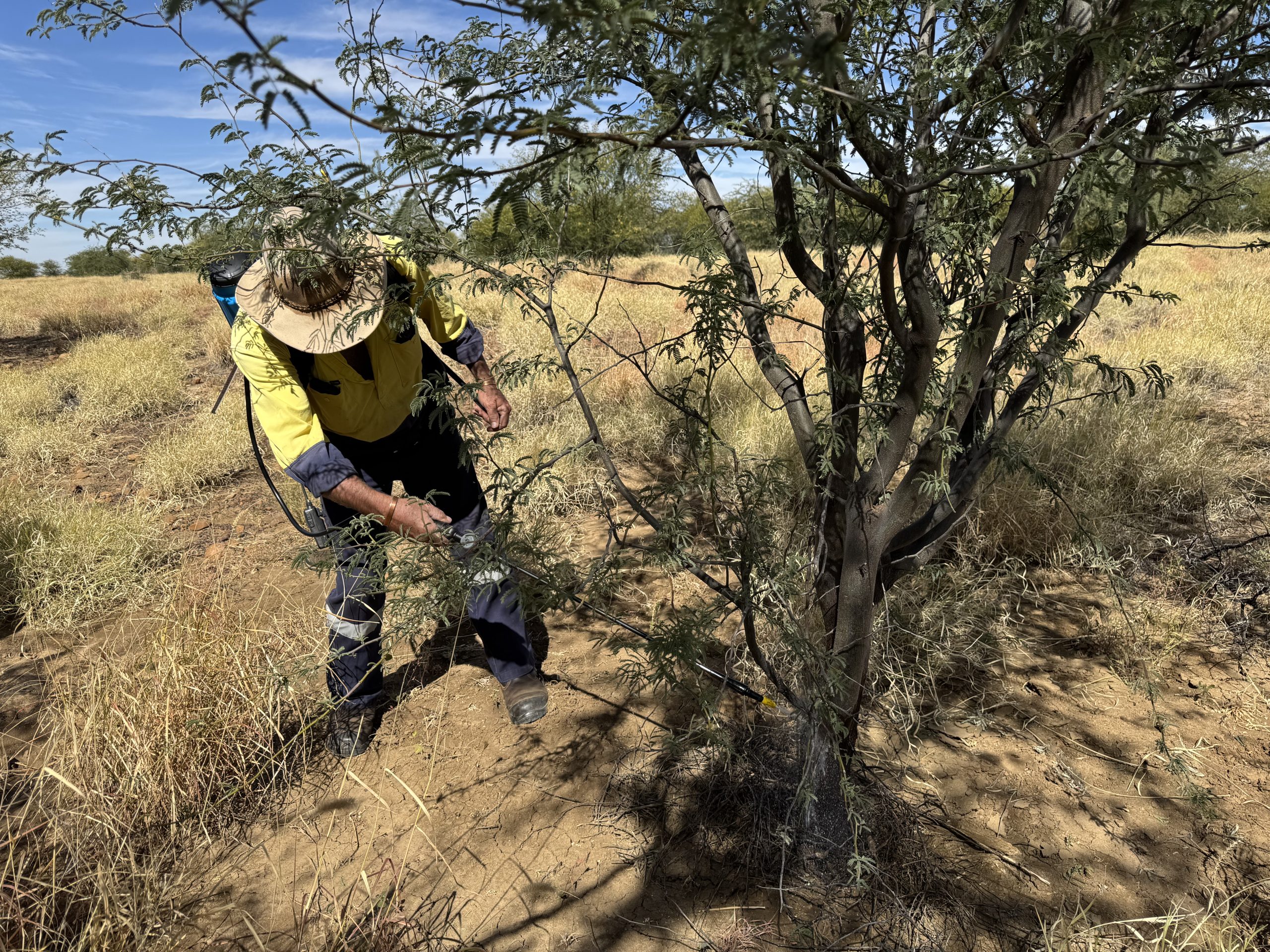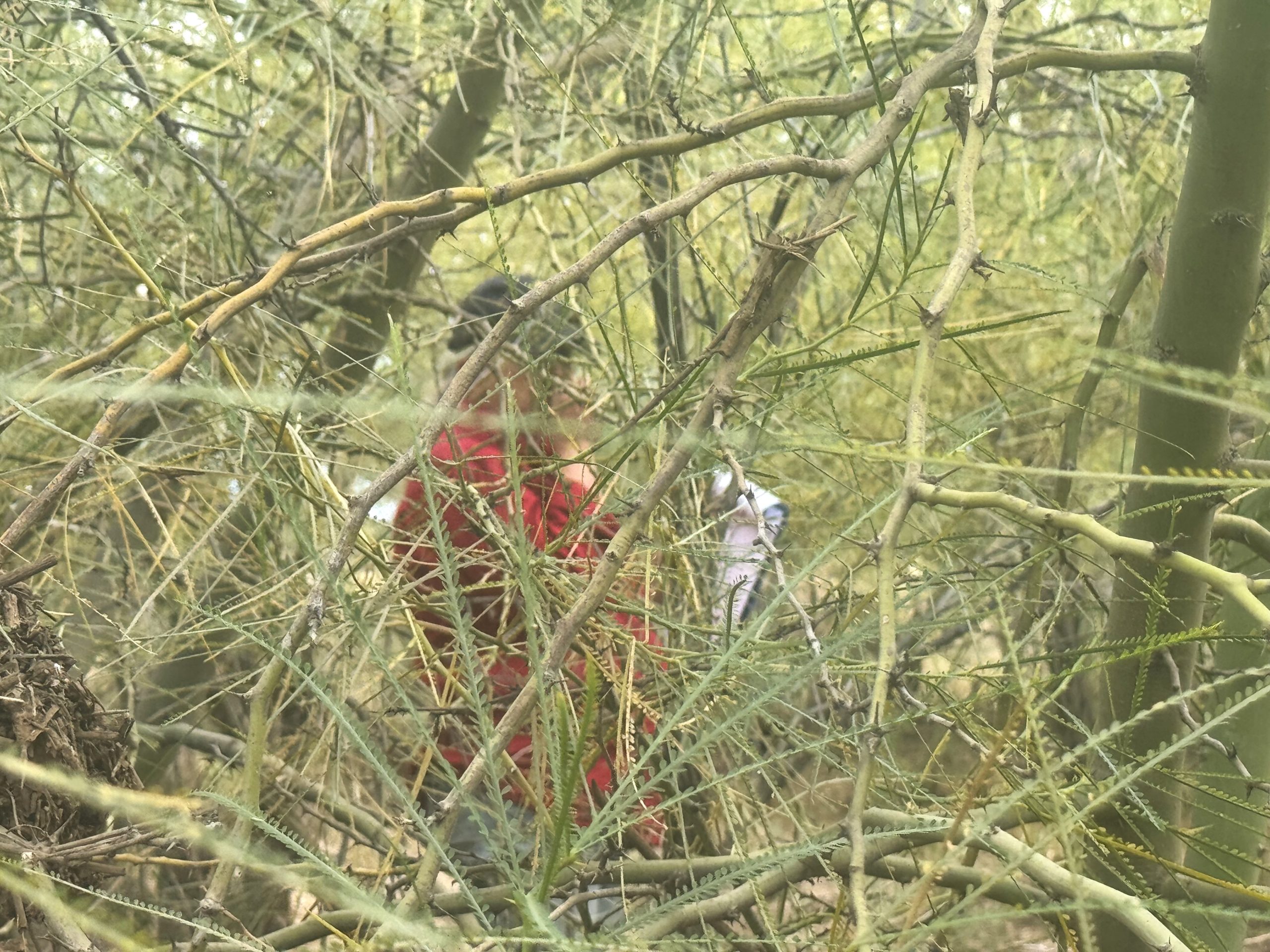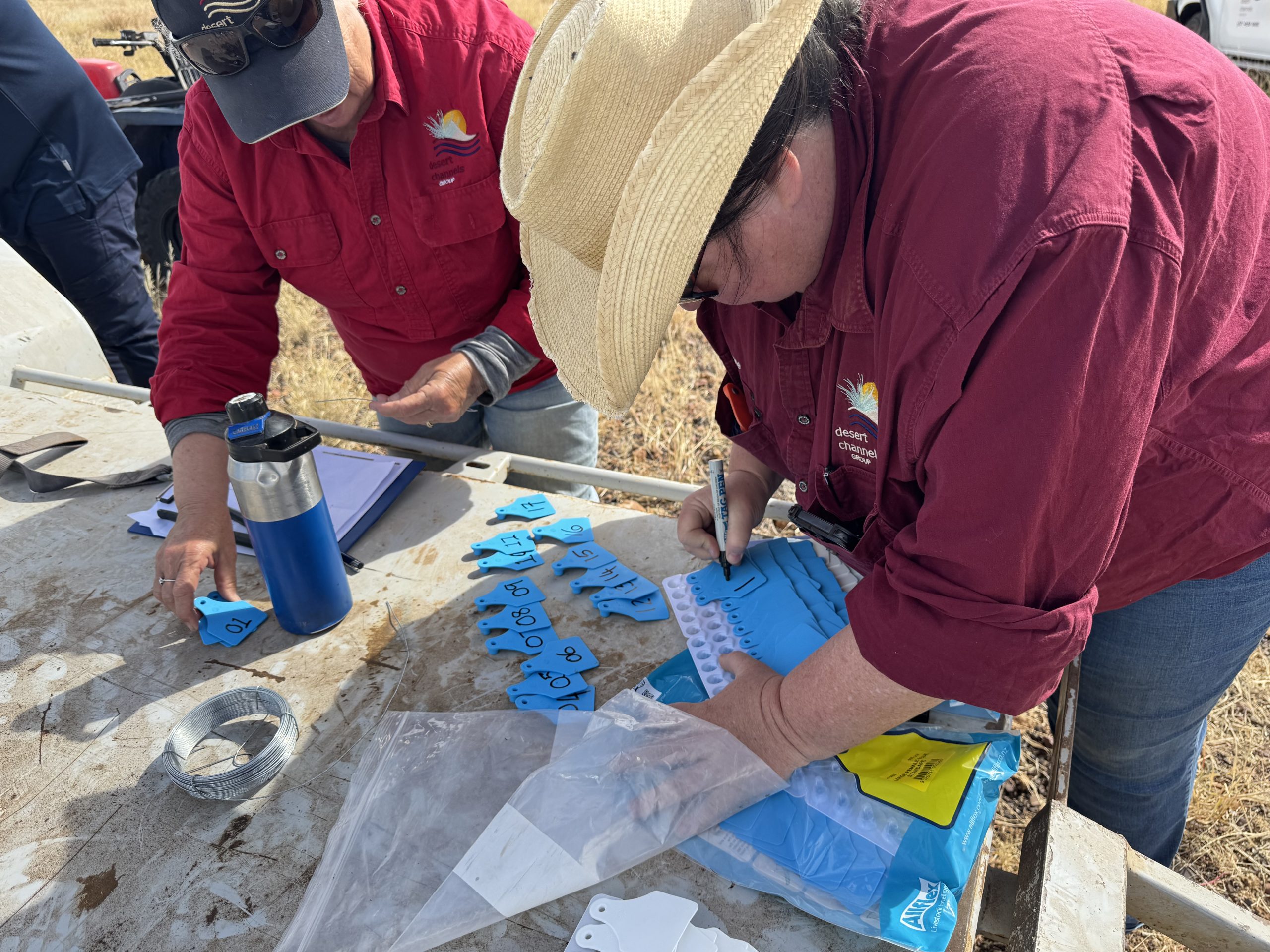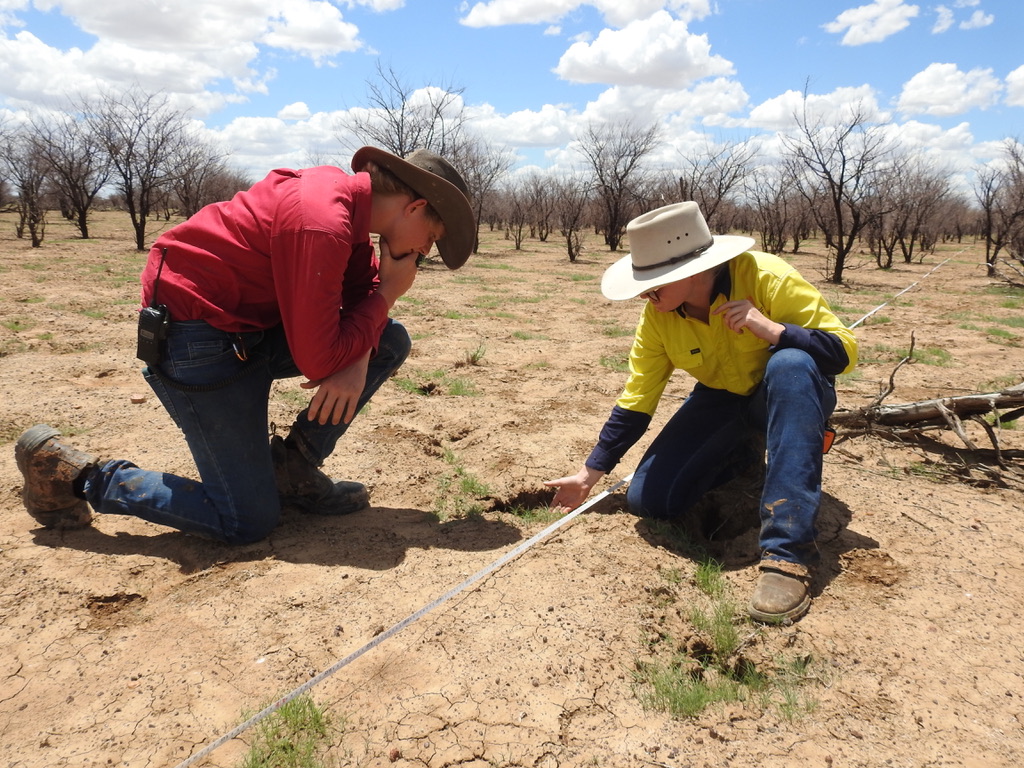Herbicide trial underway to control ‘worst’ woody weeds
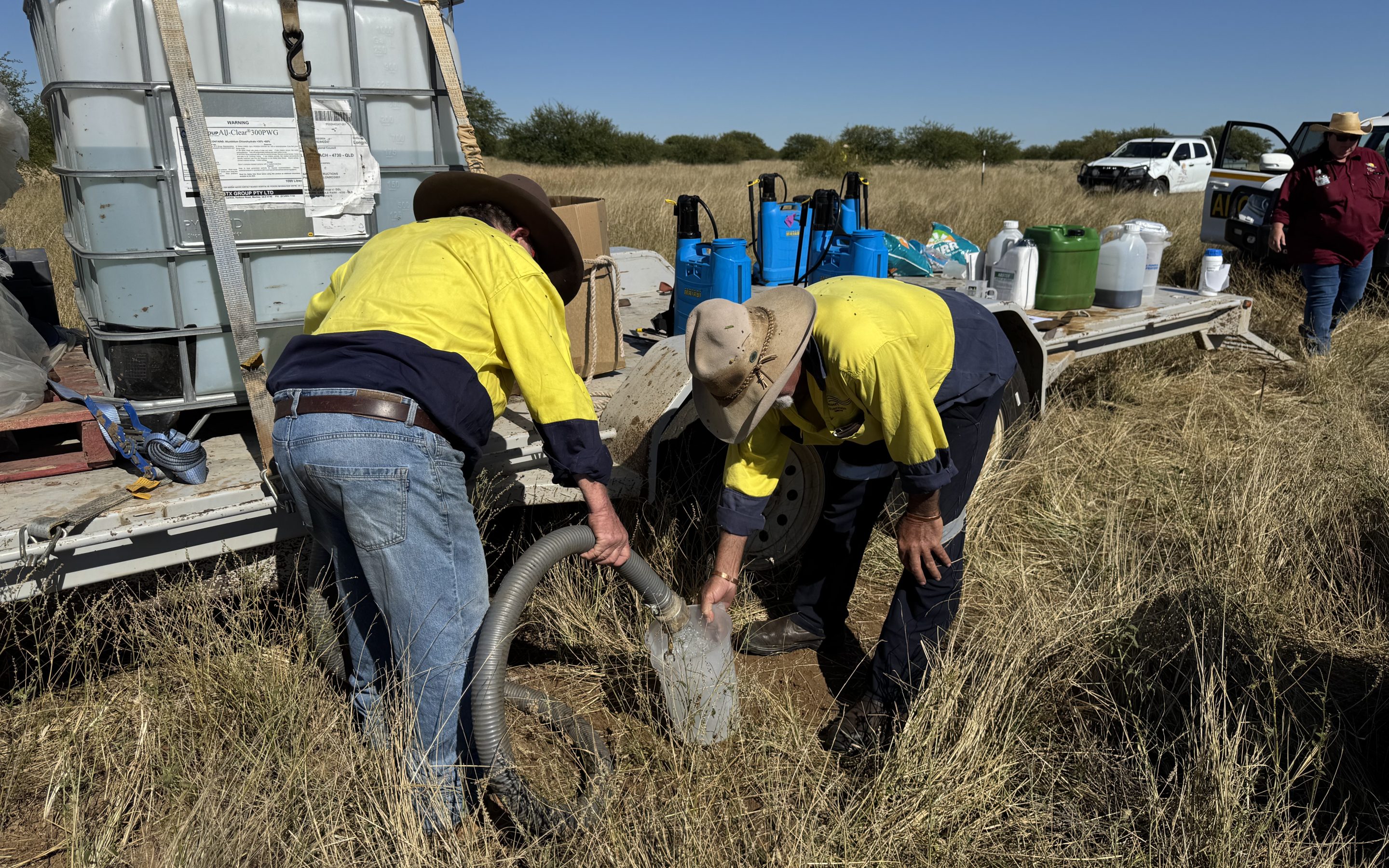
Can a new herbicide control our worst weeds?
A trial is underway to test a herbicide that mixes with water instead of diesel on Parkinsonia, Mesquite and Prickly Acacia in the Desert Channels region.
The herbicide, which is called Method 240SL and produced by environmental specialists Envu, is approved for treating Prickly Acacia and Mesquite through foliar spray in Australia.
We are testing the best protocols for basal bark application for Prickly Acacia and Mesquite, which is an effective technique for controlling weeds near waterways. The trial will also determine effective ways to control Parkinsonia with Method 240SL.
How the trial will work:
- Four sites have been selected near Aramac, Muttaburra, Winton and Kyuna to run replicated trials on parkinsonia, mesquite and prickly acacia.
- The DCQ field team are testing the herbicide at several different rates and have used basal bark application to spray the invasive weeds on control sites.
- DCQ and Envu will monitor these sites over the next twelve months to determine the most effective rate of basal bark application on parkinsonia, mesquite and prickly acacia.
Listen to our full conversation
If successful, this herbicide could offer a more sustainable, cost-effective, and potentially more effective solution for woody weed control compared to diesel-based alternatives.
We spoke with Ed Bracey, Envu’s Rural Specialist, who explains.
Read the transcript
CRISPIAN YEOMANS, HOST:
It’s been a busy week in Western Queensland. Envu and Desert Channels have been out and have just returned from four properties across Central West Queensland where they have been trialling a new herbicide control. Ed Bracey is a Rural Specialist at Envu – Ed, tell me about these trials.
ED BRACEY, ENVU RURAL SPECIALIST:
Yeah, so we’ve been working with a new herbicide for control of some invasive woody weed species in this area over a number of years, particularly Prickly Acacia, Mesquite and Parkinsonia. The new herbicide we’re trialling is called Method.
It has an active ingredient called aminocyclopyraclor. Method’s been registered in Australia for only a couple of years now, and we have had registrations for a couple of those weeds as foliar application.
We needed to do some more trial work to establish a registration for basal bark treatment of those trees. So that’s what we’ve been doing. We’ve put down a number of trials in around Winton, and Longreach, Muttaburra, and further north at Kyuna.
Those trials are probably the last in a series of trials that we’ve been doing all over Western Queensland, and that should give us enough data then to submit for an official label claim for basal bark application.
CRISPIAN YEOMANS:
If the trials on these four properties are successful, we might start seeing Method as a potential option for controlling Mesquite or Parkinsonia or Prickly Acacia?
ED BRACEY:
It will certainly – it already is an option if you wish to foliar spray, but it will certainly give the landholders more options. And the nice thing about using Method as basal bark is that it’s a non-diesel-based application. If you’re applying herbicides along waterways and things like that, and you don’t want to get diesel into the waterways, then it’s going to be a very nice alternative to using something like Access and diesel, which is widely used because you can’t put things like grassland pellets in waterways. People tend to basal bark in those areas, but keeping diesel out of it is also a nice outcome for us.
CRISPIAN YEOMANS:
And what sort of results do we need to see in these trials for approval for basal bark application?
ED BRACEY:
In general, the APVMA require us to do trials in a couple of geographic locations over a couple of different seasons. So what we’re hoping to get is some final outcomes within 12 months to two years that show that we kill the prickly acacia and mesquite without any regrowth.
That’s what the ultimate aim is. We’ve also been putting out some fairly low rates just to see how low we can go and push the boundaries on our performance to reduce the cost for the landholder as well. So if we can reduce the rates, obviously it’s a cheaper option then too.
CRISPIAN YEOMANS:
Lower rates, that chemical will go further at controlling larger patches of your problematic weeds.
ED BRACEY:
Yes – and the other thing that we have been doing is looking at different rates on larger trees versus smaller trees. So we may come up with some outcomes where if the trees are smaller, you can use a lower rate, but you need to use a higher rate for a larger tree.
CRISPIAN YEOMANS:
And walk me through what Envu did specifically on properties in this past week. Did you have the method chemical out and what were you doing with it?
ED BRACEY:
This week we’ve actually engaged DCQ to set up and monitor these trials with us. They pre-mapped the properties and pegged out the areas that we’re going to treat, which made it very efficient for us.
We went on-farm, we measured the basal diameters of trees, we did a pre-spray assessment of the tree health. Also there’s been an assessment done on the pasture and vegetation health as well, and composition.
So that’s quite time consuming. And then each of these trees has been geolocated with GPS marks and photographed, tagged, and then we treated them. And that was done by the DCQ field crew. So they were treated as you would treat in a commercial type situation, not just a trial situation.
CRISPIAN YEOMANS:
And the results will be coming in soon, I hope?
ED BRACEY:
Well, the first assessment’s going to be in a month’s time. We would call that an initial brownout type assessment.
CRISPIAN YEOMANS:
And what will you be looking for in that assessment?
ED BRACEY:
Well, we’ll be looking to see what percentage of the foliage has basically turned brown, started to die. We don’t expect to have complete tree death or anything within one month.
These trees can take some time to die, and especially larger ones. And so we’ll monitor this trial for three months, six months, 12 months, and then potentially two years.
CRISPIAN YEOMANS:
When are landholders likely to have access–
ED BRACEY:
–To use this as a basal bark treatment?
CRISPIAN YEOMANS:
Yeah.
ED BRACEY:
Ultimately the APVMA take nearly 12 months to approve a label claim.
Once the trials are finalised, we get the final reports, and then we submit to the APVMA. It could take two to three years before we actually get a label claim. So it is a time-consuming process, and we know from our earlier trials that we have had very good results.
We’re hoping that these will support that, and then we’ll be able to have enough data to make that claim. One thing that we really are interested in, because at the moment we’re using a bottom label rate of 5% method for basal barking, we want to reduce that by half, down to 2.5%, which would make our treatment cost comparative with, say, an Access and diesel.
CRISPIAN YEOMANS:
So it’d be competitive – it’d be a competitive alternative that is also water-based?
ED BRACEY:
Yes, non-diesel, and that makes it a lot more convenient for people. Imagine if you’re in a remote location doing a lot of Access and diesel, you’ve actually got to go and source that diesel in town or somewhere. Whereas if you’re using water, you can get that locally on site quite often from a bore or tanks and things like that. It does make it a lot more convenient too.
CRISPIAN YEOMANS:
It’s the last step for a new potential application for Method and for an environmental and potentially more cost-effective solution for weed control?
ED BRACEY:
Absolutely. This is probably the last step for our basal bark claim in these weeds. Obviously, we do have a lot of ongoing other trials on different species, like Mother of Millions and cactus. We’re also investigating some of the weeds like Chinee Apple, Callitrope, Rubber Vine.
So it’s an ongoing process for us and we keep developing our label.
CRISPIAN YEOMANS:
Fantastic. Ed, anything else that you wanted to add?
ED BRACEY:
No, I’d just like to acknowledge the support of DCQ with the trial work we’ve been doing.
We have a very good relationship with DCQ and hopefully that’ll be ongoing and we’ll be able to work together to bring new solutions to the landholders out here in a way of tackling their invasive weed problems.
CRISPIAN YEOMANS:
Sounds great. Looking forward to it.
